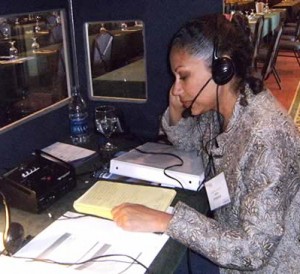Greater than 3 minutes, my friend!
Recording, Consent and Copyrights What We Need To Know
This article was originally published in The NAJIT Observer in September 2012
– by Gio Lester ©2012
During a conference assignment, not too long ago, I was confronted with a very uncomfortable situation. Unbeknownst to the team of interpreters, the company that had hired us made arrangements for recording our work. Fortunately, it was not our first time in those waters, and we knew how to tread them.
But I remember the first time I found myself in that situation. It was over 20 years ago, here in the US, and I could not understand why my colleagues were so upset. Well, I got an ear-full and learned a valuable lesson. I am bringing that up because many novices are unaware of the important groundwork already laid for them with regard to professional standards and copyrights.
 So, let’s get straight to the point: Why isn’t it okay for the company that hired you to record your voice? Well, a few things happen to the sound of your voice on its way to the CD.
So, let’s get straight to the point: Why isn’t it okay for the company that hired you to record your voice? Well, a few things happen to the sound of your voice on its way to the CD.
 According to the ASTM International* guidelines (F-2089-01, section 10.13, page 7), “Any recording of the interpretation changes the very nature of the interaction by adding on a future, and perhaps different, use of the interpreter’s product.” The bit about “adding a future” surprised me a little. I was at first concerned with misspoken numbers and the like, then that phrase caught my attention to the purpose of the recording, possible future uses, etc. This reminded me of Henrietta Lacks who had her cancer cells (HeLa cells) collected, used for research, distributed and commercialized all over the world without her consent or knowledge or financial benefit.
According to the ASTM International* guidelines (F-2089-01, section 10.13, page 7), “Any recording of the interpretation changes the very nature of the interaction by adding on a future, and perhaps different, use of the interpreter’s product.” The bit about “adding a future” surprised me a little. I was at first concerned with misspoken numbers and the like, then that phrase caught my attention to the purpose of the recording, possible future uses, etc. This reminded me of Henrietta Lacks who had her cancer cells (HeLa cells) collected, used for research, distributed and commercialized all over the world without her consent or knowledge or financial benefit.
But I still was not sure of what my rights were or where they stemmed from. Researching the AIIC (Association Internationale des Interprétes de Conférence) website I found the full explanation. Knowledge really is a powerful weapon. In the interpreters’ case, when a recording is involved, the key words are “consent” and “copyright.”
Most times, the person working directly with the interpreters at the event is not aware that recording our voices is a violation of our rights, and they simply think they are keeping their customer happy without any further consequences.
Through AIIC I learned that “The performance of conference interpreting is protected by international law.” And the Berne Convention stipulates that when committed to fixed media of any nature the performance of the conference interpreter becomes a translation and its author has exclusive rights. The protection of the author’s copyrights is the main purpose of those rules.
Does that mean recording and/or transcription of our work is forbidden? No. Both ASTM and AIIC are clear on that point — here enters the second keyword, consent. ASTM (F-2089-01, 10.13, page 7) states “When commercial use of any recording is contemplated, questions of intellectual property rights may be involved… all parties involved should be consulted beforehand when a recording of a meeting is being considered.” Furthermore, AIIC’s standard contract has language that addresses the issue by stating that the interpretation is provided “…solely for direct and immediate use by the listeners; no recording may be made, either by the listeners or anyone else, without the prior consent of the interpreters concerned.”
So we go back to the HeLa cells case discussed above in which consent and knowledge were missing. ASTM International and AIIC are working to prevent third parties from benefiting — financially or otherwise– from the work of interpreters without their consent or knowledge.
Once all parties involved in a contract are aware that recording will take place, special accommodations can be made to ensure that it is all done properly – from the speaker’s speed, terminology research, type of equipment used, to the languages used (I have had presenters insist on speaking “Portuñol” – a Portuguese/Spanish hybrid – and my colleagues in the Spanish booth walked out). There is also an added fee owed the interpreters for the transfer of copyrights to the client.
How did my recent assignment end up with regard to the translation? I sent all the reference material I mention above to the agency that hired me and we renegotiated my fee.
Knowledge is power.
References:
*ASTM International is the former American Society for Testing and Materials.
1. Publication ASTM F-2089-01 – 10.13; pg 7 –
10.13 Recording of the Interpretation—Any recording of the interpretation changes the very nature of the interaction by adding on a future, and perhaps different, use of the interpreter’s product. When commercial use of any recording is contemplated, questions of intellectual property rights may be involved. For all of these reasons, all parties involved should be consulted beforehand when a recording of a meeting is being considered.
2. AIIC:
- http://aiic.net/page/58 (items 5 and 6.)
- http://aiic.net/page/628 (item 3.10)




Thank you so much for sharing it here as well, Gio! Very interesting topic! So, in your opinion, what’s the best way to inform your clients about these issues when you’re taking on a new interpreting assignments? Should all interpreters have a form or a contract that stipulates their rights which clients have to sign beforehand?
Good question, Dmitry. I believe all it requires is for professionals to be knowledgeable of their rights and where to find information to provide to their clients – hence, the article. I have written another article Embrace Your Interpreter where I discuss client education and go a step beyond, promoting a solution.
During my term as Administrator of the Interpreters Division of the American Translators Association (2005), I had the opportunity to coordinate the development of a booklet later published as “Interpreting: Getting it Right,” edited by Chris Durban. That is only to illustrate that this is a subject very dear to me.
As I said, knowledge is a powerful weapon.